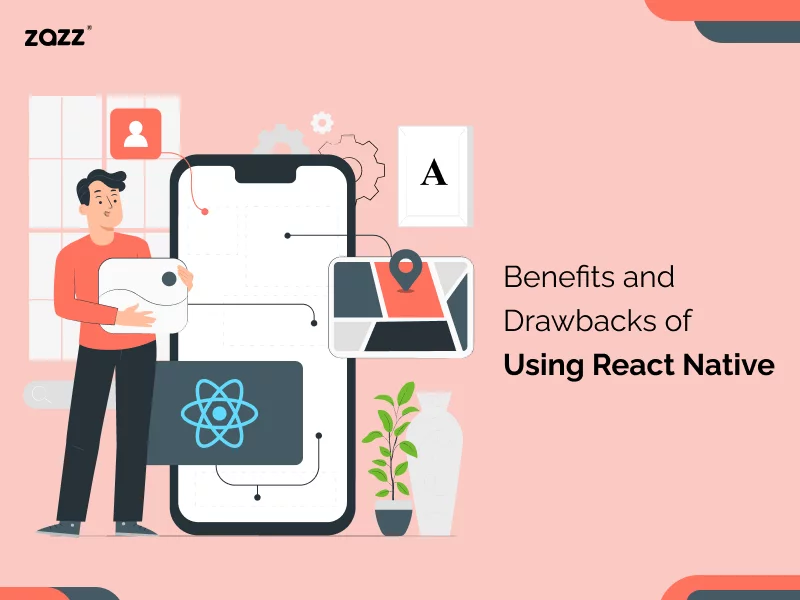React Native mobile apps have become an increasingly popular choice as cross-platform app development gains more and more traction, hence pe. Unquestionably, React Native is a potent cross-platform development framework that benefits developers in a number of ways.
It does, however, have certain drawbacks as well. At our react native app development company, our experts will go over the benefits and drawbacks of React Native in this article so you can assess whether or not the framework is a good fit for your project’s needs.

The benefits of React Native
Why should your hire developers for React Native over other cross-platform development frameworks, and what makes it so popular? Let’s investigate.
Reusability of Code
Code reuse is one of the main benefits of using React Native. Developers have the benefit of writing code once and using it often when creating a react native app. In other words, they are not required to write distinct code for each platform, unlike the flutter mobile app. 90% of the code can be reused, and it can be used for both online applications and mobile platforms. The app is ultimately developed more quickly than it would have if it had been built individually as a result of the time savings. You can also choose to hire iOS app developers.
Promotes Rapid Development
React Native also has the benefit of speeding up the app development process. The framework is made up of numerous pre-made or ready-to-use components that significantly speed up the development process. Developers can write the code in advance thanks to an open-source library. When needed, these pre-written codes are simple to employ.
Hot and Live Reloading
The live and hot reloading capability of React Native, which likely distinguishes it from its competitors, is another benefit to add to the list. The purpose of the latter is for app development companies to maintain app functionality despite any runtime modifications. In other words, even if the files were refreshed, you would not lose the app’s present state. You can also follow the adjustments in real time. You can see the changes without having to recompile.
Stable Community
React Native is an open-source, free-to-use platform that enables developers to contribute their expertise to the development of the framework. On Stack Overflow, the community has close to 50,000 active contributors. As a result, if any developer ever runs into problems using React Native, someone will undoubtedly step in to help them solve their problems. Additionally, it benefits the platform developers from the support of Facebook, the dominant player in the social media space.
Does Not Need A Big Team
In contrast to native development, where different teams would be needed for Android and iOS development, if you choose React Native, you will need a JavaScript developer who can write code for both platforms (Android and iOS). When an app needs additional native features, assistance from native developers will occasionally be required, but more often than not, the team will be small and simpler to manage.
Fast React Native Apps
React Native code is frequently thought to be either inefficient or detrimental to performance. Even if JavaScript code might not run as quickly as native code, the speed difference would often be insignificant. Hire top native mobile developers to resolve this issue.
Negative aspects of React Native
Now let’s discuss the drawbacks of React Native before you decide to hire react native app developers.
Tough to Debug
Debugging React Native-based apps can be challenging. This is due to React Native’s use of Java, C/C++, JavaScript, and Objective-C in its development, which makes the debugging process a little time-consuming. As React Native alternates between the thread of JavaScript and the Native environment, developers need to have a fundamental understanding of the native platform. Android app flutter is also a popular choice.
Not the Best For Complex UIs
React Native also has the drawback that it might not be the best solution for handling intricate user interfaces. A native app would be preferable if the programme requires complex interactions, screen transitions, or animations. Despite having a gesture responder system, React Native’s framework isn’t robust enough for intricate designs.
It’s Hard to Create a Cross-Platform Team
Someone needs to be proficient in both web and native technologies in order to be proficient in React Native. It would be preferable if they had practical JavaScript experience and could work on project configuration, CI, UX principles, etc.
Is Missing a Few Custom Modules
Even though it is an established framework, React Native still needs some elements. Even while the majority of the custom modules you could need are readily available, well-documented, and functional, it’s possible that you’ll have to create your solution from scratch. Engage the top iOS app developers for hire for this job.
Last Word
These are some of the main advantages and disadvantages of React Native. Consider them carefully and decide whether using React Native is the best option for you. If React Native does not meet your needs, Zazz can assist you in finding other solutions, such as Flutter, Ionic, Node.js, Xamarin, etc.
As the driving force behind WikiPluck, I am dedicated to curating and sharing insightful knowledge across a spectrum of subjects. From technology trends to Business advice, WikiPluck strives to be a go-to resource for those seeking to enhance their understanding and make informed decisions.
Join me on this journey of discovery and enlightenment as we pluck the gems of wisdom from the vast landscape of knowledge.
